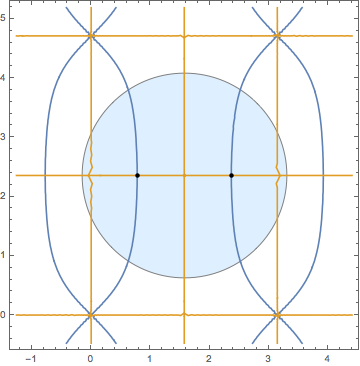Here's a polynomial interpolation method, which can be be found in Chapter 5 of [Boyd (2014)](http://epubs.siam.org/doi/book/10.1137/1.9781611973525).
nn = 64;
z0 = w1 + w2;
rr = 1.1 w1;
ff = N[WeierstrassP[z0 + rr #, inv] - L, Precision[#]] &;
wprec = MachinePrecision;
tj = 2 Pi*Range[0, nn - 1]/nn;
wj = N[Exp[I tj], wprec];
fj = ff /@ wj; (* f[zj] *)
aa = InverseFourier[fj]/Sqrt[nn];
(* Rough check of accuracy of interpolation *)
"condition"@# -> Log10@Ratios[#] &@N@MinMax@Abs@fj
ip = FromDigits[Reverse@aa, (z - z0)/rr];
Max@Table[(ff[z] - ip)/ff[z] /. z -> z0 + r Exp[I t] // N // Abs,
{r, (1/8 - 0.01) rr, rr, rr/8}, {t, 0., 2 Pi, 0.2/r}]
(*
"condition"[{0.0694093, 0.75655}] -> {1.03742}
3.98344*10^-11
*)
z2 = Eigenvalues@companionMatrix[aa];
roots = z0 + rr*Select[z2, Abs[#] < 0.999 &]
(* {0.776416 + 2.35619 I, 2.36518 + 2.35619 I} *)
Graphics[{
EdgeForm@Gray, LightBlue, Disk[ReIm@z0, rr], Gray, Point[ReIm@z0],
First@plt,
Black, PointSize[Medium], Point@ReIm[roots]},
Frame -> True]

Auxiliary code:
For the companion matrix, you can use
companionMatrix[coeffs_] :=
Join[SparseArray[
Band[{1, 2}] -> 1, {Length@coeffs - 2, Length@coeffs - 1}],
{-coeffs[[;; -2]]/coeffs[[-1]]}
];
Or
companionMatrix = NRoots`CompanionMatrix